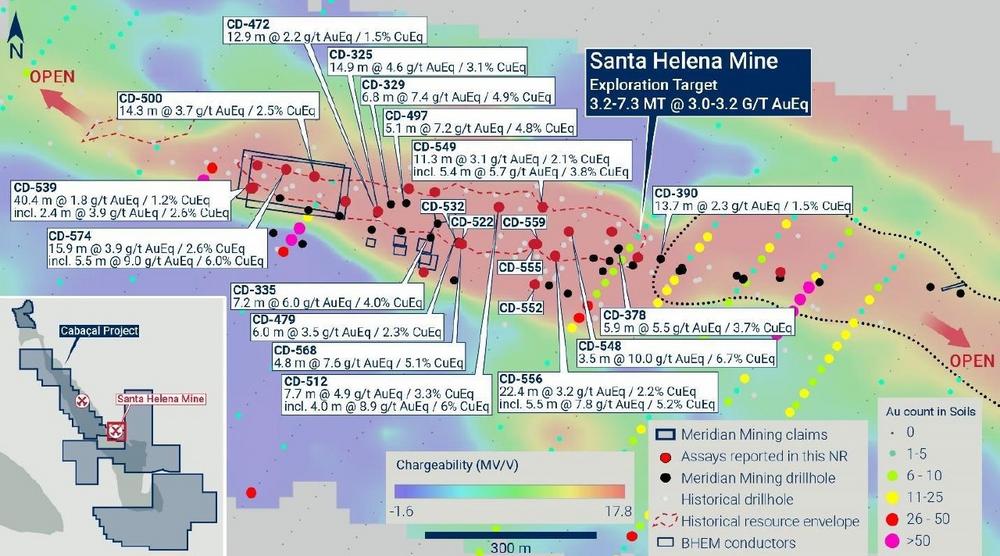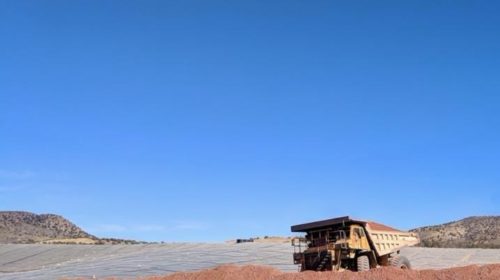
Meridian reports high-grade assay results & new geophysical targets at Santa Helena
Highlights Reported Today
- Meridian’s Santa Helena drill program reports continued high-grade Au-Cu-Ag & Zn mineralization;
- Meridian intercepts more shallow high-grade Au-Cu-Ag & Zn mineralization at Santa Helena;
– CD-574: 9m @ 3.9g/t AuEq / 2.6% CuEq from 58.2m; Including:
5.5m @ 9.0g/t AuEq / 6.0% CuEq from 60.1m;
– CD-556: 4m @ 3.2g/t AuEq / 2.2% CuEq from 9.2m; Including:
5.5m @ 7.8g/t AuEq / 5.2% CuEq from 21.3m ;
– CD-512: 7m @ 4.9g/t AuEq / 3.3% CuEq from 61.1m; Including:
4.0m @ 8.9g/t AuEq / 6.0% CuEq from 61.6m;
– CD-549: 3m @ 3.1g/t AuEq / 2.1% CuEq from 43.4m; Including:
5.4m @ 5.7g/t AuEq / 3.8% CuEq from 43.4m;
– CD-548: 5m @ 10.0g/t AuEq / 6.7% CuEq from 47.6m;
– CD-568: 8m @ 7.6g/t AuEq / 5.1% CuEq from 48.0m; - Santa Helena’s geophysical program has outlined near-mine open upside to test; and
– Open targets to test for potential massive sulphide extensions defined by Mise-à-la-Masse, new BHEM tool, and surface surveys.
See technical note for true thickness estimate and separate AuEq and CuEq equations.
Mr. Gilbert Clark, CEO, comments: “This strong flow of high-grade gold, copper, silver and zinc assays from shallow depths at Santa Helena, confirms the over 1.0km continuity of the host sulphide mineralization, as does its potential to convert into our next high-grade open pitable deposit. I’m pleased with Santa Helena’s advance with the resource estimate scheduled for the fourth quarter, while the ongoing mining and engineering studies are placing it into our Hub and Spoke development pipeline. The tailored geophysical programs over Santa Helena have outlined some new, near-mine extensional targets and also provided a set of targeting parameters to explore the greater belt for similar but “blind” massive sulphide mineralization, allowing us to more accurately target Cabaçal’s upside.”
Santa Helena Drill Results
Santa Helena’s drilling has delivered a steady flow of gold, copper, silver zinc and some lead mineralization, consolidating the footprint of the deposit’s western, central and eastern sectors. The geometry, depth, continuity and robust grades of the mineralization to date indicate that Santa Helena’s potential to host open pitable resources continues to be maintained. Drilling remains in progress to characterize the western limit of the deposit, where CD-574 returned 15.9m @ 3.9g/t AuEq / 2.6% CuEq from 58.2m, including a higher-grade core of 5.5m @ 9.0g/t AuEq / 6.0% CuEq from 60.1m.
Drilling was also directed further to the west, where lower angle oblique holes are necessary due to access constraints. CD-539 returned 40.4m @ 1.8g/t AuEq / 1.2% CuEq from 16.9m in this position. This is not representative of true width given the angle of drilling, but is considered commensurate with adjacent intersections on the southern flank of the deposit.
Similar important results have been delivered over the shallower up-plunge sector of the deposit to the east, with results from CD-556 highlighting the presence of mineralization at shallow depths, returning 22.4m @ 3.2g/t AuEq / 2.2% CuEq from 9.2m, including 5.5m @ 7.8g/t AuEq / 5.2% CuEq from 21.3m. Drill holes CD-555 and CD-559 were collared as a fan 41m northwest along strike, crossing an area where there was some conflicting information in historical collar positions, and where some historical records had only partial composites from BP Mineral’s last phase of historical drilling. CD-555, drilled at a lower-angle to the VMS body, returned multiple intersections including a down-hole zone of 13.1m @ 3.7g/t AuEq / 2.5% CuEq from 29.7m. CD-559 was drilled at an angle more representative of the true with of the mineral horizon, and returned multiple intersections, including: 11.2m @ 1.9g/t AuEq / 1.3% CuEq from 12.0m, including 3.3m @ 4.1g/t AuEq / 2.8% CuEq from 17.8m. The area includes other intersections from angled holes, CD-552, CD-522, CD-568, CD-532 (Figure 1), defining a shallow dipping sheet of near surface mineralization that would appear a good nucleus for a starter pit, subject to ongoing studies.
The eastern sector drilling also includes robust results from the northern synformal fold limb of the deposit, such as CD-549: 11.3m @ 3.1g/t AuEq / 2.1% CuEq from 43.4m, including 5.4m @ 5.7g/t AuEq / 3.8% CuEq from 43.4m, and CD-548: 3.5m @ 10.0g/t AuEq / 6.7% CuEq from 47.6m. This position appears to be disrupted somewhat by faulting migrating to the west, although the new geophysical surveys define a potential target for an offset of this fold-limb position.
Santa Helena Geophysics
Meridian is now deploying a range of bore-hole electromagnetic (“BHEM”) and surface geophysical methods to test for possible near-mine sulphide extensions that are positioned beyond the limits of the know massive sulphide pile.
The Geonics probe shows versatility in better mapping the lower conductivity sulphide assemblages, typical of those present along the Cabaçal belt to date. BHEM has advanced in the western sector of the Santa Helena prospect. Modelling of the BHEM plates is resolving conductors of up to 150m strike length with a conductivity thickness of 10 – 52 Siemens, aligning well with the thickened hinge zone of the massive sulphide pile. Higher conductivity plates appear to correlate with intersections with higher copper sulphide content (survey of CD-497, in which individual sample grades peaked between 3.1 – 4.5% Cu). The higher conductivity response is slightly oblique to the main trend with a more northwesterly strike. Potentially this reflects some zonation, with studies ongoing.
CD-574, CD-332 and CD-497 were used as platforms for a Mise-à-la-Masse (“MALM”) bore-hole geophysical survey. The MALM survey method maps surface potentials (or voltages) associated with resistivity contrasts linked with geology. Sulphide bodies are particularly amenable to the technique due to their conductivity contrast against more resistive host rocks. The three drill holes were selected at the western limit of the historical mine area (as the presence of historical mining cavities can subdue the natural signal). The survey detected a response over known sulphide mineralization, although unexpectedly a trend emerged projecting to the northwest with an offset peak located ~75m northwest of the CD-574 collar position (“Figure 2”). This outlying trend deflects back and merges again with the known mineralization around the CD-497 position. The anomaly overlaps with the position of fixed loop surface EM conductors. It is possible that a non-sulphide conductivity response may be generated by features such as a weathering trough, but the anomaly has interesting context and some drilling will be directed into this area. A positive supporting feature is that the strike of the more conductive BHEM anomaly projects towards the trend of the MALM anomaly.
About Meridian
Meridian Mining is focused on:
- The development and exploration of the advanced stage Cabaçal VMS gold‐copper project;
- The initial resource definition at the second higher-grade VMS asset at Santa Helena as the first stage of the Cabaçal Hub development strategy;
- Regional scale exploration of the Cabaçal VMS belt to expand the Cabaçal Hub strategy; and
- Exploration in the Jaurú & Araputanga Greenstone belts (the above all located in the State of Mato Grosso, Brazil).
The Preliminary Economic Assessment technical report (the “PEA Technical Report”) dated March 30, 2023, entitled: "Cabaçal Gold-Copper Project NI 43-101 Technical Report and Preliminary Economic Assessment, Mato Grosso, Brazil” outlines a base case after-tax NPV5 of USD 573 million and 58.4% IRR from a pre-production capital cost of USD 180 million, leading to capital repayment in 10.6 months (assuming metals price scenario of USD 1,650 per ounces of gold, USD 3.59 per pound of copper, and USD 21.35 per ounce of silver). Cabaçal has a low All-in-Sustaining-Cost of USD 671 per ounce gold equivalent for the first five years, driven by high metallurgical recovery, a low life-of-mine strip ratio of 2.1:1, and the low operating cost environment of Brazil.
The Cabaçal Mineral Resource estimate consists of Indicated resources of 52.9 million tonnes at 0.6g/t gold, 0.3% copper and 1.4g/t silver and Inferred resources of 10.3 million tonnes at 0.7g/t gold, 0.2% copper & 1.1g/t silver (at a 0.3 g/t gold equivalent cut-off grade). Santa Helena mine area generated an initial Exploration Target with a tonnage range of 3.2 –7.2 Mt grading between 3.0 – 3.2g/t AuEq*, which gives a potential high-grade metal inventory range of between 306,000 to 763,000 AuEq ounces, located within 10km of the proposed Cabaçal mill site.
Readers are encouraged to read the PEA Technical Report in its entirety. The PEA Technical Report may be found on the Company’s website at www.meridianmining.co and under the Company’s profile on SEDAR+ at www.sedarplus.ca.
The qualified persons for the PEA Technical Report are: Robert Raponi (P. Eng), Principal Metallurgist with Ausenco Engineering), Scott Elfen (P. E.), Global Lead Geotechnical and Civil Services with Ausenco Engineering), Simon Tear (PGeo, EurGeol), Principal Geological Consultant of H&SC, Marcelo Batelochi, (MAusIMM, CP Geo), Geological Consultant of MB Geologia Ltda, Joseph Keane (Mineral Processing Engineer; P.E), of SGS, and Guilherme Gomides Ferreira (Mine Engineer MAIG) of GE21 Consultoria Mineral.
On behalf of the Board of Directors of Meridian Mining UK S
Mr. Gilbert Clark – CEO and Director
Meridian Mining UK S
Email: info@meridianmining.co
Ph: +1 778 715-6410 (BST)
Stay up to date by subscribing for news alerts here: https://meridianmining.co/contact/
Follow Meridian on Twitter: https://twitter.com/MeridianMining
Further information can be found at: www.meridianmining.co
In Europe:
Swiss Resource Capital AG
Jochen Staiger & Marc Ollinger
info@resource-capital.ch
www.resource-capital.ch
Technical Notes
Samples have been analysed at ALS laboratory in Lima, Peru. Samples are dried, crushed with 70% passing 85% passing 200µm. Routine gold analyses have been conducted by Au‐AA24 (fire assay of a 50g charge with AAS finish). High‐grade samples (>10g/t Au) are repeated with a gravimetric finish (Au‐GRA22), and base metal analysis by methods ME-ICP61 and OG62 (four acid digest with ICP-AES finish). Visible gold intervals are sampled by metallic screen fire assay method Au‐SCR21. Samples are held in the Company’s secure facilities until dispatched and delivered by staff and commercial couriers to the laboratory. Pulps and coarse rejects are retained and returned to the Company for storage. The Company submits a range of quality control samples, including blanks and gold and polymetallic standards supplied by Rocklabs, ITAK and OREAS, supplementing laboratory quality control procedures. Approximately 5% of archived samples are sent for umpire laboratory analysis, including any lots exhibiting QAQC outliers after discussion with the laboratory. In BP Minerals sampling, gold was analysed historically by fire assay and base metals by three acid digest and ICP finish at the Nomos laboratory in Rio de Janeiro. Silver was analysed by aqua regia digest with an atomic absorption finish. True width is considered to be 70-90% of intersection width, except for low-angle holes CD522, CD-539, CD-552, which are considered-d to be 30-50% of true width. Assay figures and intervals are rounded to 1 decimal place.
Gold equivalents for Santa Helena are based on metallurgical recoveries from the historical resource calculation, updated with pricing forecasts aligned with the Cabaçal PEA. AuEq (g/t) = (Au(g/t) * 65%Recovery) + (1.492*Cu(%) * 89%Recovery) + (0.474*Zn% * 89%Recovery)) + (0.013*Ag(g/t) * 61%Recovery)). CuEq (%) = (Cu(%) * 89%Recovery) + (0.318*Zn% * 89%Recovery)) + (0.67*Au(g/t) * 65%Recovery) + (0.0087*Ag(g/t) * 61%Recovery)).
The Mise-à-la-Masse survey is being conducted using the Company’s in-house team, utilizing its GDD GRx8-16c receiver and 5000W-2400-15A transmitter. Data is processed by the Company’s independent consultancy Core Geophysics. Geophysical and geochemical exploration targets are preliminary in nature and not conclusive evidence of the likelihood of a mineral deposit.
Qualified Person
Mr. Erich Marques, B.Sc., FAIG, Chief Geologist of Meridian Mining and a Qualified Person as defined by National Instrument 43-101, has reviewed, and verified the technical information in this news release.
FORWARD-LOOKING STATEMENTS
Some statements in this news release contain forward-looking information or forward-looking statements for the purposes of applicable securities laws. These statements address future events and conditions and so involve inherent risks and uncertainties, as disclosed under the heading "Risk Factors" in Meridian’s most recent Annual Information Form filed on www.sedarplus.ca. While these factors and assumptions are considered reasonable by Meridian, in light of management’s experience and perception of current conditions and expected developments, Meridian can give no assurance that such expectations will prove to be correct. Any forward-looking statement speaks only as of the date on which it is made and, except as may be required by applicable securities laws, Meridian disclaims any intent or obligation to update any forward-looking statement, whether as a result of new information, future events, or results or otherwise.
Swiss Resource Capital AG
Poststrasse 1
CH9100 Herisau
Telefon: +41 (71) 354-8501
Telefax: +41 (71) 560-4271
http://www.resource-capital.ch
CEO
Telefon: +41 (71) 3548501
E-Mail: js@resource-capital.ch
![]()



